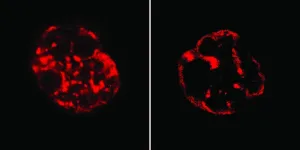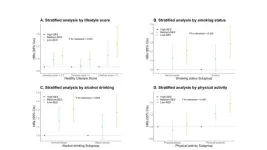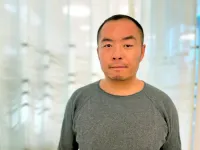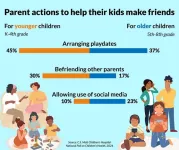American Academy of Sleep Medicine Foundation and Restless Legs Syndrome Foundation co-fund RLS research
Emory professor Shawn Hochman is the recipient of a joint research grant
2024-09-16
(Press-News.org) The American Academy of Sleep Medicine Foundation has joined forces with the Restless Legs Syndrome Foundation to fund research leading to new treatments and a cure for RLS.
Earlier this year, the AASM Foundation began an agreement with the RLS Foundation to co-fund basic and clinical RLS research. The partnership for 2024 includes the following research priorities:
Neurobiological interaction: Elucidate the points of interaction between RLS-relevant neurotransmitters, neuronal pathways, and iron deficiency.
Pharmacologic treatments: Elucidate effects of novel pharmacological approaches on RLS.
Clinical practice: Research based on innovations in patient care delivery including population health programs, technology-enabled health care delivery (i.e., telemedicine) and public health initiatives.
The recipient selected for this joint research grant is Shawn Hochman, a professor in the department of cell biology at Emory University School of Medicine in Atlanta, Georgia, for the topic, “Sensory Dysfunction in a Diet-Induced Deficiency Mouse Model of RLS: Characterization and Control by Dopamine-Sensitive Spinal Gating Circuitry.”
The AASM Foundation will continue this partnership with a new grant cycle that will open later this year.
About the AASM Foundation
The AASM Foundation is the official philanthropy of the American Academy of Sleep Medicine. Our values, programs, and purpose are focused on investing in people, research, and communities to improve the sleep health of all people. Learn more about the AASM Foundation by visiting foundation.aasm.org.
About the Restless Legs Syndrome Foundation
Restless Legs Syndrome Foundation is a registered 501(c)(3) non-profit corporation that is dedicated to improving the lives of men, women, and children who live with this often-devastating disease. The organization’s goals are to increase awareness, improve treatments, and advance research to find a cure. To learn more about the RLS Foundation, visit rls.org.
###
END
[Attachments] See images for this press release:
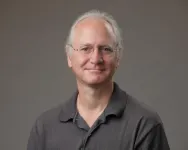
ELSE PRESS RELEASES FROM THIS DATE:
2024-09-16
Discovery expands understanding of how language is produced by the brain
Current method of mapping brain language function for surgery using electrical stimulation hasn’t changed in 50 years
Finding could make it easier on patients and doctors to identify critical language sites in the brain to preserve function after surgery
CHICAGO --- When surgeons perform brain surgery on people with brain tumors or epilepsy, they need to remove the tumor or abnormal tissue while preserving parts of the brain that control language and movement.
A new Northwestern Medicine study may better inform doctors’ ...
2024-09-16
Astronomers have used the NASA/ESA James Webb Space Telescope to confirm that supermassive black holes can starve their host galaxies of the fuel they need to form new stars.
The international team, co-led by the University of Cambridge, used Webb to observe a galaxy roughly the size of the Milky Way in the early universe, about two billion years after the Big Bang. Like most large galaxies, it has a supermassive black hole at its centre. However, this galaxy is essentially ‘dead’: it has mostly stopped forming new stars.
“Based ...
2024-09-16
Imagine you’re looking at millions upon millions of mysterious genetic mutations. With CRISPR gene-editing technology, a select few of these mutations might have therapeutic potential. However, proving it would mean many thousands of hours of lab work. Just figuring out which ones are worth exploring further would take a lot of time and money. But what if you could do it in the virtual realm with artificial intelligence?
CREME is a new AI-powered virtual laboratory invented by Cold Spring Harbor Laboratory (CSHL) Assistant Professor Peter Koo and his team. It allows geneticists to run thousands of virtual experiments ...
2024-09-16
Statement Highlights:
There are a variety of interrelated social and structural factors that contribute to differences in cardiovascular health among Asian Americans, and these factors are likely different within individual Asian ethnic subgroups.
Asian Americans and Asian immigrants are quite diverse and comprise many ethnic groups.
Social determinants, such as immigration-related factors, discrimination, socioeconomic status, English proficiency and cultural beliefs, may influence health behaviors, access to health care and the ability ...
2024-09-16
Researchers from the Kind Group have gained new insights into the mechanism behind the spatial organization of DNA within the cells of early embryos. When an embryo is first formed after fertilization, each cell has the potential to become any cell type of the body. The researchers have studied the spatial organization of DNA that is so particular to these early developmental stages. The paper was published in Nature Genetics on September 16th, 2024.
Every cell in our body contains the same DNA. ...
2024-09-16
A recent study conducted by researchers from Shanghai Jiao Tong University School of Medicine and Fudan University has revealed a significant association between socioeconomic status (SES) inequality and the risk of developing age-related macular degeneration (AMD). Published in Health Data Science, the study highlights how a healthy lifestyle can mitigate some of the risks associated with low SES.
Socioeconomic disparities have long been a concern in various health outcomes. This study, led ...
2024-09-16
Researchers at Uppsala University have developed a gel inspired by cow slime for patients suffering from disc herniation. By adding the mucin gel immediately after surgery, it is possible to create a protective barrier around the discs to prevent the immune system from attacking their nucleus pulposus. This keeps the discs intact and reduces the risk of further damage.
“This new approach offers hope for those suffering from back pain caused by disc herniation and may prevent further damage after removing ...
2024-09-16
ANN ARBOR, Mich. – Developing friendships is often seen as a natural part of childhood but it may be easier for some kids than others.
And many parents worry about their children’s friendships, according to the University of Michigan Health C.S. Mott Children’s Hospital National Poll on Children’s Health, with one in five saying their child ages six to 12 has no friends or not enough friends.
Ninety percent of parents believe their child would like to make new friends.
“Friendships can play a significant role in children’s overall health and development, emotional well-being, ...
2024-09-16
Can artificial intelligence (AI) help reduce deaths in hospital? An AI-based system was able to reduce risk of unexpected deaths by identifying hospitalized patients at high risk of deteriorating health, found new research published in CMAJ (Canadian Medical Association Journal) https://www.cmaj.ca/lookup/doi/10.1503/cmaj.240132.
Rapid deterioration among hospitalized patients is the primary cause of unplanned admission to the intensive care unit (ICU). Previous research has attempted to use technology to identify these patients, but evidence is mixed about the application of prediction tools to ...
2024-09-15
People who eat more ultra-processed foods (UPF) are at increased risk of developing type 2 diabetes, but this risk can be lowered by consuming less processed foods instead, finds a new study led by researchers at UCL.
The study, published in The Lancet Regional Health – Europe in collaboration with experts at the University of Cambridge and Imperial College London, investigated the relationship between the degree of food processing and type 2 diabetes risk, including which kinds of UPF were most high-risk.
The team analysed UPF intake and health outcomes for 311,892 individuals from eight European countries over 10.9 years on average, during which time 14,236 people developed type 2 ...
LAST 30 PRESS RELEASES:
[Press-News.org] American Academy of Sleep Medicine Foundation and Restless Legs Syndrome Foundation co-fund RLS research
Emory professor Shawn Hochman is the recipient of a joint research grant


